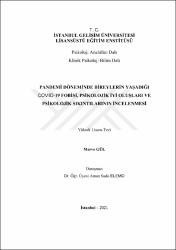| dc.contributor.author | Gül, Merve | |
| dc.date.accessioned | 2022-01-27T13:05:22Z | |
| dc.date.available | 2022-01-27T13:05:22Z | |
| dc.date.issued | 2021 | en_US |
| dc.identifier.uri | https://hdl.handle.net/11363/3312 | |
| dc.description | Danışman: DR. ÖĞR. ÜYESİ AMAN SADO ELEMO
Yer Bilgisi: İstanbul Gelişim Üniversitesi / Lisansüstü Eğitim Enstitüsü / Psikoloji Ana Bilim Dalı / Klinik Psikoloji Bilim Dalı
Konu:Psikoloji = Psychology
Dizin: | en_US |
| dc.description.abstract | Çalışmanın amacı, pandemi döneminde bireylerin yaşadığı COVID-19 fobisi, psikolojik iyi oluşları ve psikolojik sıkıntılarının incelenmesidir. COVID-19 pandemisinde vaka sayılarının artışı ile birlikte bireylerin psikolojik iyi oluşlarında azalma, psikolojik sıkıntı düzeylerinde artış olduğu söylenebilir. Buna bağlı olarak da COVID-19 fobisi (koronafobi) gelişebileceği düşünülmektedir. Bu araştırmada Psikolojik İyi Oluş Ölçeği, Psikolojik Sıkıntı Ölçeği ve Koronavirüs-19 Fobisi Ölçeği kullanılmıştır. Ayrıca araştırmacı tarafından hazırlanan Sosyodemografik Bilgi Formu kullanılmıştır. Araştırma örneklemini yetişkin bireyler oluşturmaktadır. Ölçme araçları çevrimiçi süreçlerle 18 yaş ve üzerindeki bireylere uygulanmıştır. Anket sorularını 231'i (%63,9) kadın ve 131'i (%36,1) erkek olmak üzere 362 birey yanıtlamıştır. Araştırmaya katılan bireylerin çoğunluğu (%33,1) 1824 yaş grubu olmuştur. Araştırma sürecinde ölçme araçlarından elde edilen veriler SPSS programı kullanılarak analiz edilmiştir. Çalışmanın bulgularına göre psikolojik sıkıntı ile psikolojik iyi oluş arasında anlamlı negatif bir ilişki bulunmuştur. Öte yandan COVID-19 fobisinin hem psikolojik iyi oluş ile hem de psikolojik sıkıntı ile anlamlı ilişkisi bulunmamıştır. Yaş grubuna göre incelendiğinde psikolojik sıkıntı düzeyi en yüksek bulunan grup genç yetişkinler (18-24 yaş) olmuştur. Psikolojik iyi oluş düzeyi en az bulunan grup yine genç yetişkinler (18-24 yaş) olmuştur. Bireylerin COVID-19 fobisi düzeyinde ise anlamlı farklılık bulunmasa da göreceli olarak bireylerin yaşı ilerledikçe COVID-19 fobisinin yükseldiği görülmektedir. Literatüre yeni giren COVID-19 fobisi kavramının daha farklı örneklemlerle ve daha fazla araştırma ile desteklenerek incelenmesi gerektiği düşünülmektedir. | en_US |
| dc.description.abstract | The aim of the study is to examine the COVID-19 phobia, psychological wellbeing and psychological distress experienced by individuals during the pandemic period. It can be said that with the increase in the number of cases in the COVID-19 pandemic, there is a decrease in the psychological well-being of the individuals and an increase in the levels of psychological distress. Accordingly, it is thought that COVID19 phobia (Corona-phobia) may develop. In this study, Psychological Well-Being Scale, Psychological Distress Scale and Coronavirus-19 Phobia Scale were used. In addition, the Sociodemographic Information Form prepared by the researcher was used. The research sample consists of adult individuals. Measurement tools were applied to individuals aged 18 and over through online processes. 362 individuals, 231 (63.9%) women and 131 (36.1%) men, answered the survey questions. The majority (33.1%) of the individuals participating in the research were in the 18-24 age group. The data obtained from the measurement tools during the research process were analyzed using the SPSS program. According to the findings of the study, a significant negative relationship was found between psychological distress and psychological well-being. However, COVID-19 Phobia was not found to be significantly associated with both psychological well-being and psychological distress. When analyzed by age group, the group with the highest level of psychological distress was young adults (18-24 years old). The group with the lowest level of psychological well-being was again young adults (18-24 years old). Although there is no significant difference in the level of COVID-19 phobia of individuals, there is an increase in the COVID-19 phobia levels as individuals relatively get older. The concept of COVID-19 phobia is new to the literature. Thus, it is encouraged that further research works with different samples need to be carried out to better understand COVID-19 Phobia. | en_US |
| dc.language.iso | tur | en_US |
| dc.publisher | İstanbul Gelişim Üniversitesi Lisansüstü Eğitim Enstitüsü | en_US |
| dc.rights | info:eu-repo/semantics/openAccess | en_US |
| dc.rights | Attribution-NonCommercial-NoDerivs 3.0 United States | * |
| dc.rights.uri | http://creativecommons.org/licenses/by-nc-nd/3.0/us/ | * |
| dc.subject | Psikolojik İyi oluş | en_US |
| dc.subject | Psikolojik sıkıntı | en_US |
| dc.subject | COVID-19 fobisi | en_US |
| dc.subject | Psychological well-being | en_US |
| dc.subject | Psychological distress | en_US |
| dc.subject | COVID-19 phobia | en_US |
| dc.title | Pandemi döneminde bireylerin yaşadığı Covid-19 fobisi, psikolojik iyi oluşları ve psikolojik sıkıntılarının incelenmesi | en_US |
| dc.title.alternative | Examination of Covid-19 phobia, psychological well-being and psychological distress of individuals during the pandemic period | en_US |
| dc.type | masterThesis | en_US |
| dc.department | Lisansüstü Eğitim Enstitüsü | en_US |
| dc.relation.publicationcategory | Tez | en_US |
| dc.contributor.institutionauthor | Gül, Merve | |



















